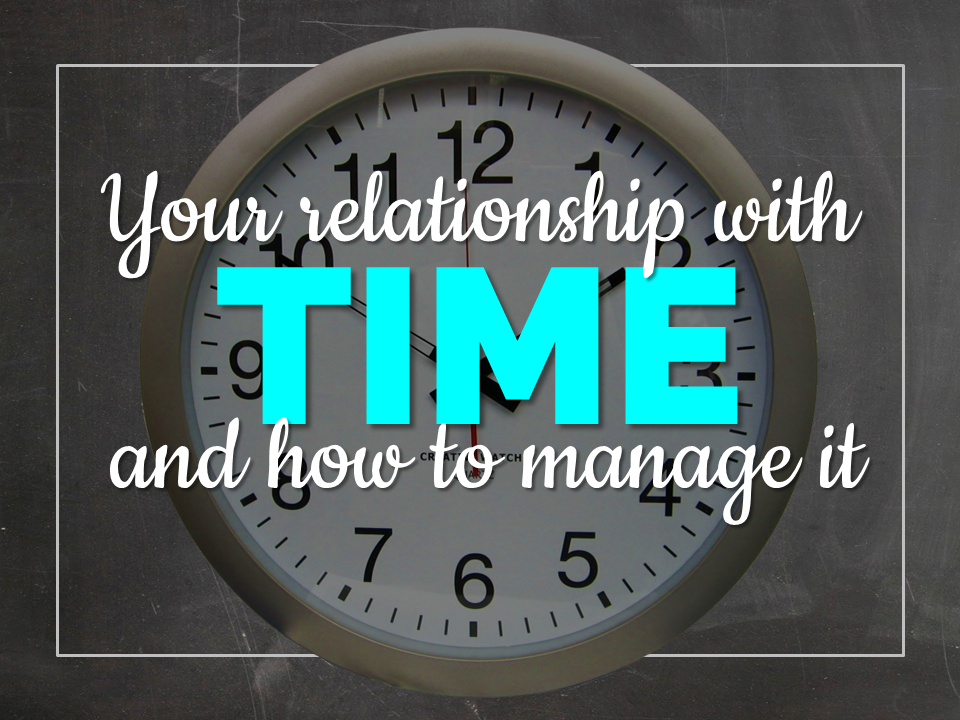You have a relationship with time.
You can feel like you’ve got enough or plenty of it, or you can feel like it’s running out or against you.
And right now, at 50, time means more now to me than ever.
It’s become very precious.
And so now, what I do in the time I have matters even more.
As a coach, it’s no surprise that clients regularly come to me with issues around time-management.
They’re struggling to fit everything in, and find it challenging to actually do the things they want to get done.
They want to have better time-management.
But time-management isn’t possible.
Because you can’t actually manage time.
Time keeps going on no matter what you do.
It never stops.
So, I think what we really mean when we say time-management, is managing ourselves.
Managing ourselves so we don’t waste the time we’ve been given.
Because time is a limited resource.
We can’t get it back.
Once it’s gone, it’s gone.
So, appreciating that time is valuable, probably the most valuable resource you have, is the first step in changing your relationship with it.
Realizing that you have just 1440 minutes a day, a third of which you spend sleeping, kind of puts it in perspective.
What do you want to do in those 960 minutes or so that you’re awake each day?
Here are some strategies on how to make the most of your time…
1. Don’t plan your time, plan your energy
So, there’s a tendency to plan our days based on time.
It’s normal, all the agendas and calendars are time-based.
However, when you base your activities on time, you don’t account for how you’re going to feel at those times.
For example, planning to do a workout at the end of the day might fit great into your time-based schedule, but your energy may be low at that time.
In that case, your planned workout will either not get done, or you’ll end up putting less effort into it (and getting less benefit).
So, for tasks that require mental or physical effort or creativity, it’s usually better to do them at the beginning of your day because that’s when your energy is the highest.
The same goes for planning items close together.
Consider your energy level when you go from an important meeting that you’re presenting to hosting a dinner party.
It may make time-sense, but it makes no sense on an energetic level.
2. Schedule your most important items first
When I say important, I mean important to you.
If something’s important to you, it’s not urgent, it’s meaningful.
Like having dinner with your family.
Or reading a book.
Or going for a walk.
If you say your health is important to you, your schedule should reflect that.
If your family is important to you, they should show up in your calendar.
I know we have a tendency to put other people’s priorities in our calendars (work, kids, partner, …), but always start with your priorities.
Write them in your calendar, no matter how small they seem.
Even those ten minutes of writing in your journal.
Put all of those important items in your calendar.
And then protect those times… These are the things that will make you feel happy, purposeful, and whole.
3. Have a solid and motivating morning routine
Someone said the best morning routine is a good evening routine.
I love that, because your morning will always be better when you’ve had enough sleep.
So, have an evening routine that gets you to sleep 7 to 8 hours before you have to wake up.
I know this is logical, but it’s not always easy in the moment.
And then create a morning routine that fuels you, a ritual that primes your mind, body, and spirit for the day.
Schedule at least 30 minutes for this routine, and if you can do 60, that’s even better.
Choose to fill that time with whatever fills you up.
Here are some ideas:
- Meditation or prayer
- Movement
- Read inspiring material
- Journal
- Listen to music
- Drink a glass of water
- Mindfully prepare a cup of tea or a healthy breakfast…
And most important…
Do these things before you check your texts, emails, and messages.
Checking your phone will distract and derail you, so don’t let your mind be taken hostage by your device first thing… There’ll be plenty of time for that later.
4. Always add down-time and buffer-time in your calendar
So, I’ve learned there are two types of people:
Those who are always early or on time; and those who aren’t.
I’m sure you could tell me which camp you’re in, and which camp each of your friends, family, and colleagues are in, too.
The thing is, we all have exactly the same number of minutes in a day.
And we’re all busy people, with important things to do.
But some of us have an innate sense of time, automatically building in buffer in case of traffic or to eat meals or to rest.
And others just struggle with this.
If being on time is a struggle, or if you feel overwhelmed or overbooked, then you have to build buffer and rest times into your day.
Add at least 50% more time to each appointment, meeting, or task in your calendar.
And start looking at your day based on energy, not time (see #1 above).
5. Say “NO” to almost everything
When your time is limited (it always is) and you have personal goals (you definitely do), you have to learn to say “NO” as your default response to demands on your time.
Unless what’s being asked is in line with your goals, get into the habit of saying “NO”.
Again, I know this is simple, but it’s not easy for a lot of us people-pleasers.
What will they think? Will I hurt their feelings? Will they be angry with me?
Your mind will offer you lots of drama when you say “NO” when you’re not used to it.
So, what I’ve learned to do is look at the other side of “NO”.
Instead of worrying about the reaction from others, I think about the benefits to me, and also, in many cases, the benefits to them.
For example, when you say “NO” to your kids asking for more money, think about the benefit to you, but also how that benefits them.
When you say “NO” to your boss asking you to (or assuming you will) stay late, imagine what you could get done in that time, and how you’re teaching your boss to respect you and your limits.
That could benefit you, your colleagues, and the entire workplace.
Saying “NO” is a huge topic that comes up in coaching all the time.
I’d say it’s pretty much universal for women in midlife to struggle with this.
But the strength, self-respect, meaning and satisfaction you get from flexing your “NO” muscle could be the most powerful thing you ever do.
For everyone.
Are you ready to manage your relationship with time?
It’s terrible thinking that you’re always behind, and you’re just never going to catch up.
I think that entertaining this thought is like shooting yourself in the foot; it’s unmotivating and will cause you to do less, not more.
Instead, imagine thinking that you’ve got everything handled, or even, that you’re ahead.
It’s empowering.
Feeling empowered will take you down a completely different path; it will change what you do, and how you feel when you do it.
And all you did was change a thought.
Managing your relationship with time is about how you think of time.
And as a coach, I can help you change these time-limiting thoughts, and build habits that create more time in your life.
If you need more time, let’s talk about how you can get more…
Talk to you soon.
In the meantime, keep moving forward,
Debbie
P.S. Does it feel like time isn’t on your side? Then change your relationship to time. It’s something I’ve worked on with countless clients, and I can help you too. Let’s talk soon.


